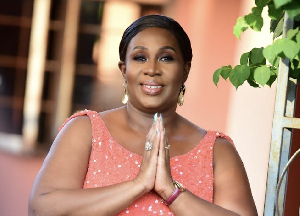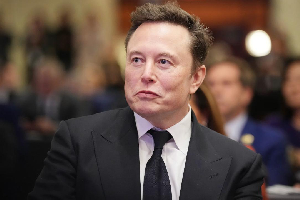Part I
Dr. Michael J.K. Bokor
E-mail: mjbokor@yahoo.com
May 8, 2010
As part of the activities marking his 60 years on this earth, the Asantehene, Otumfuo Osei Tutu II, brought together former Presidents Rawlings and Kufuor to share the same space at a function in Kumasi, joined by their wives. Images and news reports of them “sharing the Lord’s Supper” in the presence of the clergy and Otumfuo Osei Tutu attracted varied opinions.
One could see the broad smiles that they were wearing in the open and conclude that their frosty relationship was beginning to thaw. But this impression may not last for long. In an interview with Isaac Yeboah of MyJoy Online after that event, Rawlings declared what was on his mind to “keep chasing after justice for injustices, corruption and crimes that occurred under the Kufuor-led administration” (JoyFm Online, Friday, May 7, 2010).
Rawlings was reported to have said that he was grateful for the many efforts that Otumfuo was making to reconcile him and Kufuor but that it would be “a dangerous precedent to set if the many crimes and blatant corrupt practices that were fictitiously investigated do not come to justice.”
These are very serious issues which don’t only make nonsense of all the reconciliatory efforts but which also indicate that Rawlings is looking for something else. In other words, Rawlings’ demands show that he is all out for the use of the state machinery to deal with the Kufuor administration, which fuels his anger against the Mills administration’s inability to do so.
I have no doubt that the animosity between Rawlings and Kufuor cannot be resolved unless something drastic happens. I don’t yet know what that “drastic something” is but I can guess that it may come in the form of a serious happening to provide an epiphanic moment (like Saul’s Damascus experience) for them or even by way of death (which will remove one from the other and end it all). Then, the positive change (in their relationship) may happen. Both Rawlings and Kufuor are still at loggerheads, setting a very horrible example in human relationships that must be roundly condemned.
As the only surviving former Presidents of Ghana, they are expected to behave in a better manner. But they are not doing so; instead, they are nursing petty rivalries and refusing to make peace. It appears that the perks of high office have spoilt them to the point of no redemption. They have allowed their personal animosity to fester into a national problem with awkward dimensions. So far, all attempts to bring them together have failed and both continue to create needless tension whenever they open their mouths.
The intransigence with which both Kufuor and Rawlings have approached the issue is reprehensible, to say the least. Although Kufuor doesn’t come out to comment on the problem or to give conditions as often as Rawlings does, he cannot be absolved as part of the problem. But I can infer from the recent utterances of Rawlings that anybody trying to solve the problem is swimming against the current. Should Rawlings give conditions at all? Why does he think that he is right and everybody else is wrong?
The genesis of this animosity may lie deep down the political line. Kufuor served at the Ministry of Local Government under Rawlings in 1982. Then, by a quirk of circumstance, he became Ghana’s President. Can it be that Rawlings couldn’t come to terms with that swing in political fortunes? That he couldn’t accept the fact that someone who had once served under him was now his President? Was that too difficult for him to accommodate? Why should he find it difficult to adjust to that reality, anyway? Or couldn’t he imagine that he was not destined to rule Ghana and everybody forever? It must be a serious lapse in character if it were so.
He made matters worse for himself when he stretched his quest too far. Kufuor told Ghanaians how he protested against Rawlings’ attempt to manipulate him by calling meetings between both to discuss issues as if he didn’t know that it was he (Kufuor) who was the President at the time. By Kufuor’s revelation, Ghanaians got to know that cause of friction. Rawlings sought to control Kufuor and he rightly resisted that interference. Probably, this rebuff could be something that peeved Rawlings and set the stage for his vitriolic verbal attacks on Kufuor. But why should Rawlings go to that extent to think that he could dictate terms to his successor (from such an antagonistic political camp as the NPP)?
For those who may not know the background of this animosity between Rawlings and Kufuor or why it has persisted, here are some highlights:
A. THE KUFUOR FACTOR
Kufuor’s contribution to this animosity is difficult to gloss over. He is on record as having referred to Rawlings as “Abonsam” (devil) and as someone who did politics in a “patapaa” way. That was before the 2000 elections which put Kufuor in office. Then again, Kufuor bowed to unhealthy pressure from Akufo-Addo (then his Foreign Affairs Minister) and other power brokers in the NPP to deprive Rawlings of his retirement benefits and protocol allowances for daring to criticize the NPP administration. I don’t think Rawlings has forgiven Kufuor for that ill-treatment nor will he want to do so soon.
That’s not all. Kufuor stood on the NPP’s political platform at Offinso to accuse Rawlings of plotting to overthrow his government without providing evidence or doing anything to confirm that allegation (and, consequently, punish Rawlings). This dangerous allegation added more fuel to the NPP’s campaign of demonization against Rawlings and his wife (in fact, the entire NDC machinery). In the light of this demonization, it has been difficult for Rawlings to want to have anything to do with Kufuor.
Then, the recent interview that Kufuor gave to the foreign press re-opened the wound of mutual hatred. That interview contained unpalatable comments about the Rawlingses and reaffirmed Kufuor’s own poor opinion of them. In other words, Kufuor’s utterances betrayed him as someone who was being vindictive for whatever cause he wanted to serve.
B. THE RAWLINGS FACTOR
Rawlings went out of control too as he made public utterances that seriously undermined Kufuor’s integrity. Ghanaians will not soon forget his husky rhythm “Kufuor nie… Nii Ayi nie…,” an apparent representation of Kufuor as an armed robber. Indeed, Rawlings should thank God that Kufuor took all that calumny in its stride without resorting to anything diabolical against him in response. As the incumbent President who had every opportunity to unleash the security forces to clamp down on such a person who was damaging his integrity, he didn’t do so. Rawlings would have acted otherwise.
Again, Rawlings made noise that he had evidence that the Kufuor government had engaged mercenaries to assassinate him; but nothing of the sort happened. With suppressed anger, Kufuor soaked up all that public disgrace.
In other instances, Rawlings and his wife have at various times (whether in the country or on foreign tours) cast a serious slur on Kufuor, and he has returned that fire in many ways. Probably, the abortive trial of Nana Konadu Agyemang-Rawlings and the punitive action against the 31st December Women’s Movement could be some of the retaliatory moves by Kufuor.
From his utterances, Rawlings has given me a clear indication not to doubt him anymore. He doesn’t see himself as part of the problem and, therefore, a natural part of the solution. This posture is not conducive to any productive problem-solving effort.
But must we allow the animosity between these two former Presidents, their families, and supporters to continue to dominate our national discourse and deflect us from action to solve the problems that worsen living conditions for the people? For how long should this animosity drag on while the main characters themselves sit back to enjoy the largesse that the national coffers provide them at the expense of the ordinary Ghanaian tax-payer? It appears that Rawlings and Kufuor are taking Ghanaians for a ride.
(Continued in the next installment)
Opinions of Monday, 10 May 2010
Columnist: Bokor, Michael J. K.
If it is not Rawlings, then it is Kufuor…
Opinions













